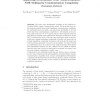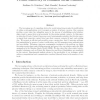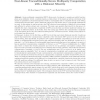23 search results - page 2 / 5 » Practical Private Set Intersection Protocols with Linear Com... |
ICALP
2007
Springer
13 years 11 months ago
2007
Springer
d Abstract) Paul Beame1, , Matei David2, , Toniann Pitassi2, , and Philipp Woelfel2,† 1 University of Washington 2 University of Toronto Abstract. We solve some fundamental probl...
FC
2005
Springer
13 years 11 months ago
2005
Springer
Two parties, say Alice and Bob, possess two sets of elements that belong to a universe of possible values and wish to test whether these sets are disjoint or not. In this paper we ...
ACNS
2011
Springer
12 years 9 months ago
2011
Springer
The increasing use of computing devices for social interactions propels the proliferation of online social applications, yet, it prompts a number of privacy concerns. One common p...
ECCV
1998
Springer
13 years 9 months ago
1998
Springer
This paper investigates the linear degeneracies of projective structure estimation from point and line features across three views. We show that the rank of the linear system of e...
IACR
2011
12 years 5 months ago
2011
Secure multiparty computation (MPC) allows a set of n players to compute any public function, given as an arithmetic circuit, on private inputs, so that privacy of the inputs as we...



